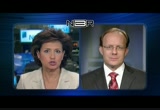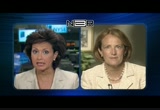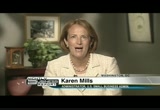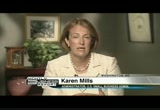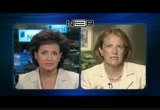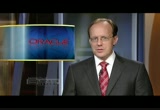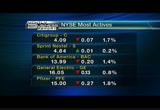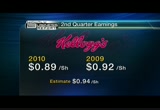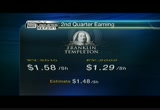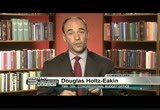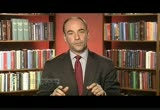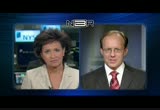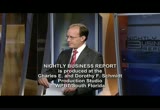tv Nightly Business Report PBS July 29, 2010 6:00pm-6:30pm PST
7:00 pm
>> susie: they're the foundation of the u.s. economy, but today a bill to boost lending to small businesses and increase hiring hit a wall in the senate. still, business owners say they need the help. >> i don't want to hire somebody and have to lay them off if work slows down. >> tom: we'll tell you what's holding her and others back from hiring. you're watching "nightly business report" for thursday, july 29. this is "nightly business report" with susie gharib and tom hudson. "nightly business report" is made possible by:
7:01 pm
this program is made possible by contributions to your pbs station from viewers like you. thank you. captioning sponsored by wpbt >> susie: good evening everyone, a big setback for small business tonight. senate republicans blocked a $30 billion plan to boost lending for the nation's small businesses. tom, president obama was counting on this bill to create jobs. >> tom: susie, the legislation also would have provided $12 billion dollars in tax breaks, but opponents argued it was just another expensive program packed with extra spending. >> susie: this impasse affects out-of-work americans, and small firms, which employ half of all american workers. many of those companies have not been hiring.
7:02 pm
erika miller introduces us to two business owners with different reasons for holding back. >> reporter: jewelry designer bonnie riconda say she's one of the fortunate small business owners. sales at her company, calico juno designs, have not gotten hammered in the midst of a weak economy. she works out of a studio in the back of her store, on city island in the bronx. >> in terms of sales we are remaining steady, which is really, really good, especially in a business where it's not a necessity. >> reporter: riconda says she often needs extra help, but is hesitant to boost payrolls until sales pick up. on the other hand, she recognizes it will take time to find the right worker and weeks to train the person to make her 850 designs, which is why she is considering hiring someone as soon as this fall. >> i would like to be able to hire somebody for right before christmas and get the store stocked up, because we do get busy last year right before christmas. >> reporter: lack of demand
7:03 pm
isn't the only problem small businesses are facing, even firms with strong sales are holding off hiring for other reasons. >> any city that has a traffic light, we have service in it. >> reporter: alex mashinsky is the c.e.o. of groundlink, a company that arranges ground transportation between any two points worldwide. revenues are up 40% in the past year, but he's not hiring. instead, the firm has been laying off workers, as you can see from the empty seats at the company's midtown manhattan call center. mashinsky says it makes better sense to invest in technology than people. >> currently, close to 40% of our transactions are done on the web, and it's because we put more and more functionality on the web. and now there are things on the web that you can't get on the phone. >> reporter: there are still other reasons some businesses are reluctant to add employees. many firms think carefully as they approach the 50-worker threshold, because they will be required to offer health insurance in 2014. but experts say, above all else,
7:04 pm
it's register receipts that drive hiring decisions. sageworks c.e.o. brian hamilton expects small businesses will start hiring in the months ahead as the recovery picks up momentum. >> once people start to tune into that and say the sky's not going to fall, then people will buy more, sales will go up, and i think employment will get better. but, it will take time. >> reporter: hiring by small business can have a big impact on the economy. over the past 15 years, the majority of new jobs have been created by businesses with fewer than 500 employees. erika miller, "nightly business report," city island, ny. >> susie: our guest tonight has devoted her career to helping small businesses. she's karen mills, the administrator of the small business administration. test. so nice to have you on our program tonight. >> delighted to be here. >> let me begin by asking you about that small business bill that has stalled in the senate. what happens snowplow. >now?>> this is an interesting,
7:05 pm
important day for small business. all day on the floor the senate has been considering an important bill that helps provide us access to capital for small business. there's been a credit crunch. this bill is going to let us help thousands of additional small businesses, and it provides tax credits for small business. so it's on the floor of the senate. it's still under consideration, and we're very, very close to having this done. >> so you think it will pass. if so, when and how soon? >> i do think it will pass, because it has very, very strong bipartisan support. this is a bill that has been built through the small business committee with really republicans and democrats working together. this is a bill that's too important to everyone to let go. and we all know that small businesses create the jobs. they create 65% of the net new jobs in this country.
7:06 pm
and this is the kind of bill that they've been looking for to help them get the tools they need to create those jobs. >> right. and we know how important it is for small businesses to get access to financing. that's an issue. why aren't they getting the credit? is it because these community banks that do most of this kind of lending lack the funds or is it because there's a lack of creditworthy borrowers? >> well, there are definitely creditworthy borrowers out there. i say to anyone who wonder about that, just travel with me around the country. yesterday i was in jacksonville, florida. i talked to a number of borrowers and three banks that are looking forward to this bill, because this bill will help community banks get more capital to lend out to small businesses. in addition, at the sba, we've been able to lend to tens of thousands of small businesses. right now we actually have a queue of 700 businesses waiting for this bill to pass, so they can get their funding as well.
7:07 pm
>> one complaint that we hear from small businesses is that when they come to the sba, your agency, to get -- whether it's loan guarantees or loans, that it takes a long time to get those guarantees, and there's a lot of red tape. what is your agency doing to speed up that process and to help them out? >> well, we're work pretty hard on the paperwork aspects, and the turnaround time. we made a lot of progress. we're looking at making sure that small businesses come to us, that they get the help they need to get connected to a bank that's lending, that we provide the guarantees to give them that extra support. if the bank is looking for more help and more collateral. we've been even now able with the recovery act to guarantee these loans up to 90%. we're turning them around in days, not, you know, months. and small businesses are really getting the capital they need with these programs. that's why it's so important that the bill pass and let us continue to get those higher guarantees out.
7:08 pm
>> i want to talk to you a little bit about taxes and tax increases. you know, the bush tax cuts will expire at the end of the year. exits that happened there could be tax increases for people earning more than $250,000 a year. now, some people say many small business owners are in that tax bracket. others say it's just a small percentage of small business owners are that income group. which is it and what impact would an increase in taxes have on small businesses? >> let me go back for a minute to the tax credits that are going to be available right now in this bill. it's really important to know that already there have been lots and lots of tax credits for small business in the recovery act. and there's additional ones in this bill that small businesses really value. so it's important to remember accelerated depreciation, extra money for hiring unemployed workers. those are already available, even healthcare tax credits are already available.
7:09 pm
it's a very small portion. only a few percent of small businesses that actually would get affected if there were tax increases in the 250,000-plus range. >> all right. we appreciate that clarification. thank you so much for coming on our program tonight. >> thank you very much. >> we've been speaking with karen mills, the administrator obf >> tom: here are the stories in stocks under pressure, the dow fell 30 points, the nasdaq lost 12 and the s&p 500 was off four. big board volume was up and nasdaq volume was 30% higher from yesterday. could the fed's promise to keep interest rates near zero for an extended period put our economy at risk of japanese-style deflation? st. louis federal reserve bank president james bullard thinks so. today he said he'd like the fed to shift away from that rate policy and focus on quantitative easing measures, like buying up government bonds.
7:10 pm
jobless claims fell for the third time in four weeks, down by 11,000 to a seasonally adjusted 457,000 claims. mortgage rates continue to fall. freddie mac says the average for 30-year fixed loans slid this week to 4.54%. and late today, the justice department sued oracle, charging it defrauded the federal government on a software contract worth millions of dollars. the contract ran from 1998 to 2006. during that time, justice says oracle's commercial clients got better deals than uncle sam. >> tom: still ahead, land owners and investors see money to be made from under these peaceful rolling hills. we look at the rush to cash in on natural gas mineral rights in michigan. >> susie: toyota has announced another big recall. this time for a steering problem on its avalon sedans. 373,000 vehicles are being recalled, from model year 2000 through 2004.
7:11 pm
toyota says there's a potential problem with the steering system that could increase the risk of a crash. the auto maker will notify car owners next month. this brings to niee million the total number of vehicles toyota has recalled worldwide in the last year, that's almost as many vehicles sold by all manufacturers in the u.s. last year.
7:12 pm
let's take a look at tonight's "market focus." >> tom: the utility and consumer staple sectors led the weakness today, while the financial sector was the only one higher. we'll start with consumer staples, and kellogg, falling almost 7% on big volume. it's now at its lowest price since september. earnings were a nickel below expectations. weak cereal sales in america and in the u.k. were hurt by recent recalls, kellogg also cut its 2010 outlook. at colgate-palmolive, meantime, earnings beat the street by a penny but, in a common refrain this earnings season, revenues were disappointing. investors washed their hands of the stock, pushing it down almost 7%. this is a one-month low. earlier this week, we noted how the utility exchange traded fund, unlike the broad market, was trading above its april high. that's no more. the sector has moved off that level over the past two sessions as several earnings have come in.
7:13 pm
constellation energy led the sector lower today, profits at its retail energy business slipped and it's slowing work toward a proposed nuclear plant, awaiting federal loan guarantees. n.r.g. energy is planning to build two reactors in texas, also hoping for federal backing. dominion power dropped 3%. earnings earlier this week were better than expected. financial stocks were the bright spot in today's trade with some specialty firms leading the charge. mutual fund company franklin resources beat its bottom line by a dime per share as it collected more money to manage. bond ratings agency moody's had a better-than-expected quarter, profits coming in five cents ahead of estimates. u.s. revenues offset a drop from overseas clients. franklin stock rallied almost 4% to a two-month high. moody's also hit a two-month high, and ameriprise led the sector with a 12% jump, thanks to stronger earnings. the world's biggest publicly traded energy company, exxon mobil, saw its fortunes rebound along with oil prices.
7:14 pm
earnings beat expectations for the first time in several quarters. refining margins helped. shares didn't see much reaction, though, they have been trending lower since last november. beyond earnings, the bidding war for car rental firm dollar thrifty continues between avis and hertz. the avis offer comes in at over $47 per share based upon tonight's closing prices. the deal dollar struck with hertz in april would give dollar shareholders $41 per share. each is a mix of cash and stock. dollar thrifty is above both of those offers tonight, and in a sign of market confidence in either deal, both potential buyers saw their stocks rally today. while stocks have been marking time this week, copper prices have jumped, and it may be worth watching. copper has moved to a three- month high with this recent rally. john kosar of asbury research is watching open interest, effectively a count of how many traders hold positions, instead of trading out of them. >> if open interest starts to
7:15 pm
dry up here, it indicates that copper prices are probably peaking. if they do, they tend to lead the dow transports lower and, of course, as the dow transports go, so goes the rest of the market. >> tom: the dow jones transportation index has been rallying as well, hitting its most recent high on monday after the bullish profit outlook from fedex, but since then, the index has stalled. and that's tonight's "market focus." >> susie: many states are
7:16 pm
experiencing something like the california gold rush, but it's not gold prospectors are after, it's natural gas. an abundance of shale gas beneath much of the u.s., and new drilling technology, have sparked a frenzy among energy companies. for many states, take michigan as an example, drilling can mean big money and big headaches. diane eastabrook shows us how one michigan county is coping. >> reporter: northern michigan is a peaceful place with rolling farmland and quaint towns. but life here is about to change. >> you've got to look out for yourself. >> reporter: recently, in this packed church, osceola county residents got a sermon about natural gas from farm extension agents. big energy companies want to drill here, and they're offering big money to property owners to lease mineral rights and drill on the land. that sparked a lot of questions from this audience. >> would you recommend that we put in an anti-inflationary clause so that we're protected?
7:17 pm
>> can you be forced to allow a pipeline to come through your property? >> reporter: michigan is the latest state to get swept up in a stampede for natural gas energy companies have been producing oil and natural gas here for nearly a century. but new technology called horizontal drilling could produce a mother lode of nat gas. the technique lets energy companies extract the fuel from shale rock which, until recently, was hard to get. shale lies beneath much of the u.s., including michigan, and experts think the rock could contain a 200-year supply of fuel. kimberly dubord follows the energy markets for briefing.com. she thinks these new reserves could play a vital role in our energy future. >> shale gas could provide almost a production buffer for alternative and renewable energy to give it time to become an economically feasible alternative to conventional sources. michigan's latest natural gas boom started just this past winter.
7:18 pm
calgary-based encana corporation drilled a successful test well about 50 miles north of here, that one well triggered a frenzy to lease mineral rights the likes of which the state of michigan has never before seen. >> reporter: this is a list of bidders who paid millions of dollars at auction last spring to lease mineral rights on roughly 100,000 acres of public land in northern michigan. sid jansma, president and ceo of wolverine gas and oil, was among the buyers. he didn't want to pay more than $1,000 an acre, but the bidding quickly topped that. >> when the auction started, the first or second lease went for $3,000 an acre. i sat there watching it go from the state minimum, which is $13, to $50 to $200 to $500 to $1,000 to $2,000 to $2,500 and $3,000. and we sat there and just marveled. >> reporter: but landowners say big drillers aren't being as generous with them, and they want the drillers to ante up. >> the initial offer was about $150 an acre, but we know that
7:19 pm
is pretty much on the low end. >> they are going to get it as cheap as they can, and they are a little bit like used car salesman. >> reporter: still, even $150 an acre could mean a hefty windfall to someone who owns several hundred acres of land. and in michigan, where unemployment tops 13%, that kind of money is tempting. that worries attorney david porteous, who's spent three decades representing landowners in drilling leases. he fears economics may prompt property owners to sign on the dotted line too quickly. >> somebody shows up at their door with a big check. "sign this lease." of course it's tempting. what a gut-wrenching sort of a decision that you have to make, "do i take it or not?" >> reporter: still, drillers could end up being the big losers. while they're confident there's a lot of gas to be had beneath northern michigan, at this point they don't know precisely where it is, and it may not be under osceola county.
7:20 pm
diane eastabrook, osceola county, michigan. >> tom: diane picks up this story tomorrow night, when it's land owner against land owner, fighting over mineral rights also tomorrow, the commerce department releases second quarter g.d.p., and our market monitor guest weighs in on prospects for a double dip recession and just what could jump start hiring. he's marshall front, chairman and chief investment officer at front barnett associates. >> susie: the secret recipe for "nooks and crannies" will remain safe, for now. the former executive for thomas' english muffins who is privy to that recipe cannot work for a rival. that's the ruling by a federal appeals court. thomas' says chris botticella is just one of seven people who knows the recipe its for english muffins. he worked at the company for months after accepting a job with rival hostess. the court says botticella can be banned from hostess while the lawsuit plays out. >> tom: amazon.com hopes smaller
7:21 pm
is better. one day after listing its kindle as "sold out" on its website, the online retailer is selling new smaller, lighter versions of its e-reader. they'll be released on august 27. one model is an updated version of the kindle 2, it sells for $189. the other is wi-fi only, with a price tag of9. that's a few dollars less than the cheapest e-readers made by sony and barnes and noble, and $360 less than apple's least expensive i-pad.
7:22 pm
>> susie: with a tax debate underway on capitol hill, rhetoric is heating up on both sides. instead, tonight's commentator thinks two principles should guide the discussion. he's douglas holtz-eakin, president of the american action forum and former director of the congressional budget office. >> the tax war of 2010 has begun. without action, the 2001 and 2003 laws expire and taxes go up a lot for everyone-- an economic insanity that only alan greenspan has endorsed. instead, congress could choose to raise taxes on nobody or-- the presidents idea-- for those making more than $250,000. what's going to happen? one thing you can count on is same tired "tax cuts for the rich" rhetoric we've heard for 10 years. the facts remain the same: everyone got a tax cut. and with the passage of time, the congressional budget office has documented that while the effective tax rate for the top
7:23 pm
20% fell, that for the remaining 80% was reduced to its lowest in 30 years. instead of this rhetoric, two principles should guide debate: growth and tax reform. the economy is growing, it is past the crisis and past the conditions that merit so-called stimulus. but it is growing too slowly, a burden borne by millions of out- of-work americans. and the tax code is, generously, a disaster. the gulf oil industry leaks less. a soviet bureaucracy is more efficient. tax reform is a must, which means low rates and a broad base. this means that raising rates and preserving a narrow base, the presidents plan, is a step in the wrong direction. low tax rates on innovation, investment, and competitiveness are especially pro-growth and steps toward tax reform. to remain pro-growth and raise more revenue, including from the rich, targeted, boutique tax breaks will be a luxury that must be sacrificed. im doug holtz-eakin. >> tom: as we wrap up tonight's program, we continue our focus on small businesses.
7:24 pm
we're asking entrepreneurs for their take on the economy and their businesses. in tonight's "getting down to business," a miami beach dry cleaner on dealing with the downturn and what it will take for him to start hiring again. >> my name is jason lowe. started in 1995 as a coin laundry self service business, and it's evolved into the dry-cleaning business. when we heard about the market conditions, i looked at making sure that we were different. how were we going to be different to make sure we retained our current clients. >> american express. >> through the economic downturn, we've actually noticed that our clients are spending less. what's actually gone down is the actual number of pieces that subis sending in. their usage has gone down over the last two years based upon the economy, and the reason why, people look at a garment, say, hey, you know what, i can wear it one more time. people want value in business. if you're able to give them value, meet their customers' experiences, your business will continue to grow. customers will help spread the
7:25 pm
word about the great experience they're having with my company, and in doing so we'll continue to grow. if i need more customer service representatives, i need more people in production, more drivers, more valets, more bookkeepers, and it will continue to grow. >> and trading emails with jason today, apparently that service is paying off. he says he does continue to hire slowly. he's added five employees this year so far. >> it's tough out there, but according to our guest tonight help might be on the way. >> we'll have to wait and see. that's "nightly business report" on this thursday evening. thanks for joining us. it's july 29th. i'm tom hudson. have a great evening, susie. >> thanks, tom. thanks for watching, everyone. we hope to see all of you tomorrow night. "nightly business report" is made possible by:
7:26 pm
this program was made possible by contributions to your pbs station from viewers like you. thank you. captioning sponsored by wpbt captioned by media access group at wgbh access.wgbh.org >> more information about investing is available in "nightly business report's" video "how wall street works". to order this dvd, call 1-800- play-pbs or visit online at shoppbs.org.
234 Views
IN COLLECTIONS
KQED (PBS) Television Archive
Television Archive  Television Archive News Search Service
Television Archive News Search Service 
Uploaded by TV Archive on

 Live Music Archive
Live Music Archive Librivox Free Audio
Librivox Free Audio Metropolitan Museum
Metropolitan Museum Cleveland Museum of Art
Cleveland Museum of Art Internet Arcade
Internet Arcade Console Living Room
Console Living Room Books to Borrow
Books to Borrow Open Library
Open Library TV News
TV News Understanding 9/11
Understanding 9/11
